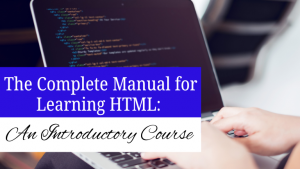The Complete Manual for Learning HTML: An Introductory Course
It is essential to have a basic understanding of web development in the digital age. The first step in developing your coding abilities, building a website, or beginning a career in web development is mastering HTML (HyperText Markup Language). This blog will walk you through an HTML course, outlining the significance of the language, what you will study, and the advantages of being proficient in it.

What is HTML?
HTML (HyperText Markup Language) is frequently used to generate and design web pages. It gives web content its fundamental structure by specifying components including headings, paragraphs, photos, links, and multimedia. The core of web development is HTML, which works with CSS (Cascading Style Sheets) for styling and JavaScript for interactivity.
Why Study HTML?
- Essentials of Web Development
The foundation of any website is HTML. HTML is necessary for anybody interested in web development because it is used to create every webpage on the internet.
- Simple to Understand and Use
HTML is a great place for beginners to start because it has a simple grammar, unlike more complicated programming languages. A simple webpage can be made with a few lines of code.
- Expands Professional Possibilities
Understanding HTML opens doors to a variety of work prospects in web development, digital marketing, UI/UX design, and other fields, as the need for websites and web applications continues to rise.
- Makes Control and Customization Possible
Knowing HTML enables you to alter and change components to suit your needs, even if you use website builders like WordPress.
- Encourages Other Coding Proficiencies
Gaining knowledge of HTML helps you become more proficient in other programming languages like CSS, JavaScript, and PHP.
In an HTML course, what will you learn?
A well-organized HTML course covers a wide range of subjects, from fundamentals to more complex ideas. An overview of what you can anticipate learning is provided below:
- Overview of HTML
- What is HTML?
- Comprehending the structure of HTML
- Configuring a document in HTML
- Fundamental HTML Tags and Elements
- Paragraphs and headings
- Lists, both sorted and unsorted
- Anchors and links
- Pictures and multimedia components
- Input Elements and Forms
- Using HTML to create forms
- Types of input (password, email, text, etc.)
- Buttons and ways to submit
- Validation of forms
- HTML Formatting and Tables
- Making tables to represent data
- Table headers, rows, and columns
- Text and element formatting
- Advanced Features and HTML5
- Header, section, article, and other semantic HTML
- Embedding audio and video
- HTML APIs (Geolocation, Web Storage, Canvas)
- Fundamentals of responsive design
Advantages of Enrolling in an HTML Course
- Learning that is structured
An HTML course offers a methodical approach, guaranteeing a seamless learning curve for novices.
- Practical Experience
You may apply what you learn in real-world situations thanks to the practical exercises and projects that are a part of most courses.
- Career Advancement and Certification
Numerous HTML courses provide certificates that boost your resume and increase your chances of landing a job in web development or a similar industry.
- Availability of a Learning Community
Participating in an HTML course gives you the opportunity to network, collaborate, and learn from other students.
- Flexible and Self-Paced Education
You can study HTML online at your own speed, which makes it easier to integrate into a hectic schedule.
Opportunities for a Career After Finishing an HTML Course
You can investigate a number of job options after finishing an HTML course, such as:
- Web Developer with Front-End
You can create and design user-friendly websites if you know how to use HTML, CSS, and JavaScript.
- Designer of Web Pages
You can work as a web designer if you have an artistic eye, using HTML and CSS to make eye-catching websites.
- Designer of UI/UX
Understanding HTML makes it easier for UI/UX designers to efficiently prototype and organize web interfaces.
- Online Advertiser
Digital marketers may enhance SEO tactics, optimize content, and change landing pages by knowing HTML.
- Manager of Content
Since HTML is used by many content management systems (CMS), content managers can better comprehend and modify online pages.
- Independent Web Developer
You can work independently creating websites for customers and businesses if you know HTML.
- Tester of Software
Quality assurance testers can verify the structure and functionality of websites by using a basic understanding of HTML.
Recent Posts!
-
How to Earn Money Online at MWCEdu by Teaching
-
Advance Excel Course: Become An Excel Expert In India- Learn Advanced Excel Online With Recorded Lessons By MWCedu
-
Unlock Your Data Skills: Why the Online Power BI Course at mwccedu Is a Game-Changer
-
Tally Prime Course in India at MWCEdu – A Complete Guide to Boost Your Accounting Career
-
Learn Python Programming Online in India with MWC Edu: Your Path to a Future-Ready Career
-
Digital Marketing Course in india: Why Learn Digital Marketing Online?
-
French Language Course Online: Starting Your French Journey: Mastering A1 Level
-
Mastering AutoCAD 2D and 3D Online: A Complete Guide for Beginners and Beyond
-
10 Content Ideas for Social Media Marketing
-
How to Start Affiliate Marketing for Beginners: A Step-by-Step Guide
Concluding remarks
The first step toward web development and digital creativity is learning HTML. Learning HTML gives you the necessary abilities to build and modify websites, regardless of your status as a student, freelancer, or future web developer. There’s never been a better moment to begin learning HTML, with so many resources and courses available.
To start your HTML training and open up countless chances in the digital world, take the first step now!
